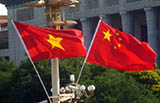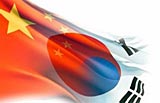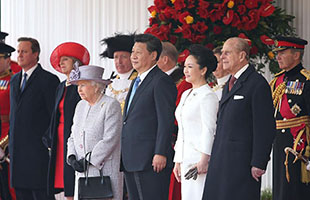Sino-French ties at strongest ever
By Michael Amouyal (China Daily) Updated: 2015-11-03 08:16Rich relationship of more than 50 years encompasses culture and economy
Nearly a year after the celebration of the 50th anniversary of their diplomatic relations, the partnership between France and China has never been better, as indicated by the unprecedented sustained pace of high-level mutual official visits, including heads of states and prime ministers.
These visits are not merely of a diplomatic nature as they lead to tangible economic results. For instance, no less than 53 commercial agreements were signed during Li Keqiang's visit to France in June.
French President Francois Hollande is currently visiting China for two days, echoing Chinese President Xi Jinping's visit to France last year. The key topic on his agenda is to prepare for the 21st United Nations Climate Conference, which will be hosted in Paris this year.
Even if the focus of the current visit is not purely on economic matters but more focused on climate change and human exchanges, climate issues and the economy are linked in many aspects and the outcome of the summit will clearly have an impact of an economic nature, between France and China and on a more global level.
Besides these state visits and international events, which attract much media attention, the relationship between France and China would not be as rich and sustained without the longstanding cultural and business relationship.
On the business side of things, the French Chamber of Commerce in China - or CCIFC - is proud to represent 1,603 French companies present in China, ranging from France's small and medium-sized enterprises to multinational companies, and it is our main task to support them in developing their activity locally, to help them in doing better business in China, to assist them in better understanding the local environment and to develop win-win partnerships with local players and governments.

After 30 years of spectacular economic growth and social change, China's economy is undergoing tremendous structural changes to reach its next phase of development. This is a very challenging time for China but also for other countries as so much transformation in the second world economic power will necessarily impact the global economy for a long time.
New norm
So far, the GDP growth is the most visible aspect of the radical change in the Chinese economy. A "medium-high" speed growth is the target of the Chinese government for the next five years and GDP around 7 percent or significantly lower will become the new norm. However there is nothing to be afraid of as this is a logical and expected trend, which is the result of a structural rebalancing between economy and services, investment and domestic consumption.
GDP growth figures should not be looked at too simplistically. Indeed, China is a huge country and shows big disparities in terms of the GDP of individual provinces.
The Chinese economy is far from being homogeneous and foreign companies are still highly encouraged to settle in cities and provinces from less developed areas, mostly located in the central and western part of the country. This is the message we are trying to convey at the CCIFC when working together with Chinese provincial authorities who want to attract French companies.
The major transformations of the Chinese economy can be worrying for some, but for us they actually create many opportunities, and represent the promise of a golden era.
Indeed, through its major evolutions, such as the rise of the Chinese middle class and the shift towards a service-based economy, we have more and more opportunities to showcase the expertise of French companies and develop our cooperation with Chinese partners and authorities, thus contributing to addressing key challenges such as food safety, sustainable urbanization or dealing with an aging population.
Made in China 2025
Technically, China is also adapting and looking into improving the quality of its manufacturing sector. This is the goal of the Made in China 2025 policy, and we believe that French companies must seize this opportunity to be China's partners and bring on their know-how.
This particular policy is part of the recent discussions for the 13th Five-Year Plan (2016-20), which is setting up the direction of travel for China over the coming years. We are satisfied to see that the Chinese government is determined to carry out some necessary and ambitious reforms. The conclusions of the fifth plenum of the 18th Central Committee of the Communist Party of China show that Chinese leaders are embracing the free market economy, focusing on raising consumption and trying to avoid the "middle income trap" through innovation and structural adjustment.
We welcome these moves even though ongoing adjustments in the Chinese economy will not be easy and there are lots of challenges ahead for the Chinese government. French companies are particularly eager to observe the reform of the State-owned enterprises, even though we know that it might take a long time. They are also pleased to observe that the reforms are taking the direction of an increasingly level playing field in terms of competition, and a more transparent application of the rule of law, evolutions which we believe are crucial to sustain exchanges on a long term. This is also what China needs to enable its companies to compete with companies in other countries in a globalized economy.
Belt and Road
China is now a global power, and the Belt and Road Initiative is the expression of China's renewed position on the international scene. France understood that very well, as the country was one of the first countries to sign the Asian Infrastructure Investment Bank agreement.
At the CCIFC, we believe that French companies can also provide support to the globalization of China, especially in collaboration with other countries where France and French companies have well-established relationships, in Africa for instance. Such partnerships already exist concretely and the latest and most famous example is the collaboration between China and France to build a reactor for the Hinkley nuclear power station in the United Kingdom.
Another key point in our relationship is the growing interest of China to invest in France, and France will continue to welcome all Chinese investments that help create jobs and growth. As the French chamber of commerce, our knowledge of the French market, supported by a network of more than 110 chambers in France, is placing us in a very good position to facilitate exchanges by linking a French offer and a Chinese demand we are dealing with everyday.
As 2015 is wrapping up, and looking ahead, China will remain one of the key players at the center of the international scene, taking over the presidency of the G20 summit, four years after the French presidency. This platform is key to present new ideas such as securing financial stability, supporting infrastructure development across the world, financing environmental protection, energy supply and consumption, but also accompanying the internationalization of the yuan. France, through its government and companies, wishes to be China's key partners in these endeavors.
The writer is the general manager of the French Chamber of Commerce in China






